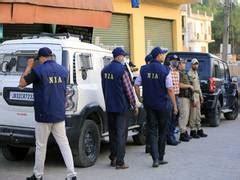
NIA questions over 20 persons in probe of ‘ISIS Maha module’
The National Investigation Agency (NIA) on Monday questioned more than 20 persons from Thane, Mumbai and Bangalore as part of its crackdown on the alleged Maharashtra module of the proscribed terror organisation, ISIS (Islamic State of Iraq and Syria). The persons were summoned “on suspicion”, said an NIA official.
Among those questioned was Areeb Majeed, a resident of Kalyan, who in 2014 had allegedly gone to Syria to join ISIS. Majeed returned to India in November 2014, after which he was arrested by the NIA. He is currently out on bail.
On Saturday, the agency had conducted searches at 44 locations in Maharashtra and Karnataka and arrested 15 persons from Padgha in Thane district for allegedly indulging in terror acts for ISIS. It said it had found weapons, cash, digital devices and flags of Hamas during the searches carried out in Padgha, Thane, Kalyan, Mira Road and Pune in Maharashtra, and Bengaluru in Karnataka.
The agency also revealed that it had arrested Mohammed Saquib Abdul Hamid Nachan alias Raveesh alias Saquib alias Khalid, the main accused and the self-declared leader of the group of arrested persons. Nachan had allegedly assumed the rights of administering ‘bayath’ (the path of alliance towards the Khalifa of ISIS) to persons joining the proscribed organisation, said police officials familiar with the investigations.
Nachan was convicted in the 2002-2003 blasts at Mumbai Central railway station, Vile Parle and Mulund under the Prevention of Terrorism Act and was sentenced to ten years’ imprisonment. After he was released, he settled down in Padgha again.
The agency claimed that the accused were operating on the directions of their foreign handlers and had been actively involved in various terrorist activities, including fabrication of IEDs, “to further the violent and destructive agenda of ISIS”. The accused are all allegedly members of the ISIS Maharashtra module and were operating from Padgha, Thane and Borivali areas, where they had “hatched a conspiracy to spread terror and violence across India”, said an NIA officer.
“Pursuing the path of violent jihad and khilafat, the accused had aimed to disturb the peace and communal harmony of the country and wage a war against the Government of India,” he claimed. “Preliminary investigations have revealed that they had declared the village of Padgha in rural Thane as a ‘liberated zone’ and as ‘Al Sham’. They were motivating impressionable Muslim youth to relocate to Padgha in order to strengthen the Padgha base.”
Source » hindustantimes.com





